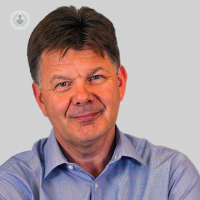What is prediabetes and what can be done about it?
Written by:Prediabetes is a condition where the level of sugar (glucose) in the blood is higher than normal, but not yet high enough to diagnose diabetes. It usually, but not always, occurs in people who are overweight and have a sedentary lifestyle. People with prediabetes are at high risk of progressing to develop type 2 diabetes. Dr David Cavan is a leading endocrinologist and author of Reverse Your Diabetes: The Step-by-Step Plan to Take Control of Type 2 Diabetes, and here he explains what prediabetes is and how it can be reversed.

What blood glucose level is prediabetic?
Prediabetes is diagnosed if the fasting blood glucose level is between 6.1 and 7.0 mmol/l. It is also diagnosed by an HbA1c blood test, which provides an overview of glucose levels over the previous 6 to 8 weeks. A level between 42 and 47 mmol/mol (6.0 to 6.4%) is diagnostic. Once levels increase above this, then the person is diagnosed as having type 2 diabetes.
What are the signs of prediabetes?
There are no specific signs or symptoms of prediabetes, although often it can be associated with being overweight, having high blood pressure and a high cholesterol level.
Can you reverse prediabetes?
Yes! It used to be thought that if you had prediabetes, then you would likely end up having type 2 diabetes and there was nothing you could do to stop that happening. Then around 15 years ago, large-scale research studies in Finland and the US demonstrated that if people with prediabetes adopt a healthier lifestyle, then they can reduce the risk of developing type 2 diabetes. Those studies also showed that in some cases, glucose levels returned to normal. Since then, many people have been able to reverse from prediabetes to normal glucose control.
What should you eat if you are prediabetic?
To my mind, the goal of treatment for anyone with prediabetes is to try and reverse the condition, and dietary changes are the most effective. In my experience, this is best achieved by cutting out sugar as much as possible and also reducing starchy carbohydrates to a minimum. That means avoiding bread, cakes, biscuits, potatoes, pasta, rice and breakfast cereals. In their place, I encourage increased intake of fresh leafy vegetables, healthy fats which are found in nuts, olives, avocadoes and unsweetened dairy products, and good quality sources of protein such as meat, fish, eggs or pulses.
If you are concerned about being prediabetic, make an appointment with an expert.


